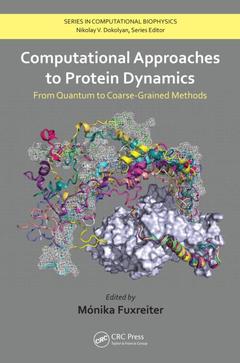Description
Computational Approaches to Protein Dynamics
From Quantum to Coarse-Grained Methods
Series in Computational Biophysics Series
Coordinator: Fuxreiter Monika
Language: English
Subjects for Computational Approaches to Protein Dynamics:
Keywords
Force Eld; IDPs; protein dynamics; MD Simulation; conformational ensemble; CG Model; enzymatic catalysis; Intrinsically Disordered; multiscale calculations (QM/MM); Implicit Solvent Model; coarse-grained (CG) models; Reaction Coordinate; molecular dynamics; Solvation Free Energy; quantum chemistry; Free Energy Prole; intrinsically disordered proteins (IDPs); Elastic Network Model; biomolecular; Id Region; directed evolution; Disordered Regions; dynamic allostery; Free Energy Landscapes; implicit solvent models; Chemical Step; small angle x-ray scattering (SAXS); Disordered Proteins; protein folding; Structural Biology; molecular recognition; QM Region; Multidomain Protein; Conformational Ensembles; Isothermal Titration Calorimetry; Mm Method; Mm Simulation; National Academy; Full QM; Mm Calculation
Publication date: 12-2014
· 15.6x23.4 cm · Hardback
Publication date: 04-2018
· 15.6x23.4 cm · Paperback
Description
/li>Contents
/li>Readership
/li>Biography
/li>
The Latest Developments on the Role of Dynamics in Protein Functions
Computational Approaches to Protein Dynamics: From Quantum to Coarse-Grained Methods presents modern biomolecular computational techniques that address protein flexibility/dynamics at all levels of theory. An international contingent of leading researchers in chemistry, physics, and biology show how these advanced methods provide insights into dynamic aspects of biochemical processes. A particular focus is on intrinsically disordered proteins (IDPs), which lack a well-defined three-dimensional structure and function as dynamic ensembles.
The book covers a wide spectrum of dynamics, from electronic structure-based to coarse-grained techniques via multiscaling at different levels. After an introduction to dynamics and historical overview of basic methodologies, the book addresses the following issues:
- Is there a quantitative relationship between enzymatic catalysis and protein dynamics?
- Which are the functionally relevant motions of proteins?
- How can structural properties and partner recognition mechanisms of IDPs be simulated?
- How can we speed up molecular dynamics?
- How can we describe conformational ensembles by the synergistic effort of computations and experiments?
While dynamics is now considered essential for interpreting protein action, it is not yet an integral component in establishing structure?function relationships of proteins. Helping to reshape this classical view in biochemistry, this groundbreaking book explores advances in computational methodology and contributes to the new, ensemble way of studying proteins.
Introduction. Enzymatic Catalysis: Multiscale QM/MM Calculations. Protein Motions: Flexibility Analysis. Approaches to Intrinsically Disordered Proteins. Large-Scale Dynamics. Ensemble Methods. Index.
Mónika Fuxreiter is head of the Laboratory of Protein Dynamics in the Department of Biochemistry and Molecular Biology at the University of Debrecen. She received her MSc and PhD from the Eötvös Loránd University of Sciences, and was a postdoctoral fellow at the University of Southern California under Arieh Warshel. Dr. Fuxreiter has 20 years of experience working on state-of-the-art approaches for biological systems, including partner recognition mechanisms of IDPs and unique regulatory mechanisms of fuzzy complexes and relationships to context-dependence.
These books may interest you

Intrinsically Disordered Proteins 157.46 €



